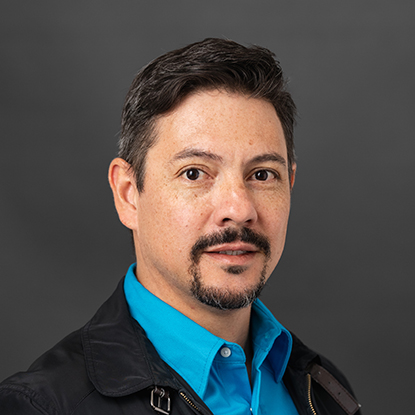My philosophical work focuses on perception and the intersection between perception and social epistemology. I am currently working on an article that supports the theory that we understand others, partly by perceiving them, by arguing that the structure of perception, in general, allows us to perceive high-level, complex objects and events, and not just simple properties. I am also working on a positive theory of aspects or perspectives for perception, in contrast to the mainstream view that perspectives are somehow obstacles for perceivers to know the world.
As a professor and academic, I am committed to making philosophy more accessible to undergraduate students and the broader public. I invite you to check out my website (alejandroarango.net) and watch the video “What We See” and find a link to my article “Moral Clumsiness” (2015). These are meant for a non-specialized public.
Before coming to 91³Ô¹ÏÍø, I held a Mellon Postdoctoral Fellowship in the Humanities at Tennessee State University (2016–2018), right after completing my doctorate at Vanderbilt, both in Nashville, Tennessee.
Arango, Alejandro. (2019). From sensorimotor dependencies to perceptual practices: making enactivism social. Adaptive Behavior, 27(1), 31–45. https://doi.org/10.1177/1059712318811897
Arango, Alejandro. “Social Enactivism about Perception—Reply to McGann.” Adaptive Behavior (2019). https://doi.org/10.1177/1059712319835162. (In reply to: McGann, Marek. “A Little More Social Enaction than That: Comment on Arango (2019).” Adaptive Behavior (2019))
Arango, Alejandro. “Expresión, intersubjetividad y mundo perceptual.” Acta Fenomenológica Latinoamericana VI. (Forthcoming)
Arango, Alejandro. “Animal Groups and Social Ontology: An Argument from the Phenomenology of Behavior.” Phenomenology and the Cognitive Sciences 15, no. 3 (2016): 403–22. doi:10.1007/s11097-015-9430-2.
Arango, Alejandro. “Moral Clumsiness.” Think 14, no. 40 (2015): 93–99. doi:10.1017/S1477175615000019.
Arango, Alejandro. “Husserl’s Concept of Position-Taking and Second Nature.” Phenomenology and Mind, no. 6 (2014): 168–76. http://dx.doi.org/10.13128/Phe_Mi-19561
Arango, Alejandro. “Tomar En Cuenta, Pensar En Compañía, Ampliar La Mente: Sobre El Sentido de La Enseñanza de Las Humanidades.” (‘Taking Into Account, Thinking in Company, Enlarging the Mind: On the Sense of Teaching Humanities.’).” Revista de La Escuela Colombiana de Ingeniería, no. 53 (2004): 42–46.
In my philosophical work, I study the social aspects of perception and the role of aspects and perspectives in all the sensory modalities (i.e., the different senses). I have on (and to ) the idea that human perception is a type of socially constituted, direct interaction with the world. This is a type of relationalism about perception that is best labeled as a social enactivism about perception (SEP).
In social epistemology, I am interested in exploring how sensory perception underscores a good deal of our social interactions with others. At the moment, I am working on an article that looks at the problem of other minds through the lens of high-level perceptual properties. I am also working on an article that, taking into account that social identities partly appear to us perceptually, explores some epistemological implications of this perceptual aspect.

